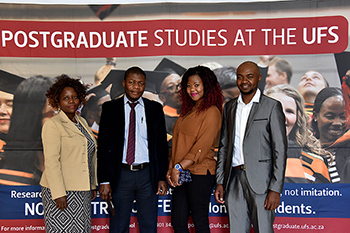
Winners of the UFS Three-Minute-Thesis competition.
From the left: Thutukile Jita, Natural/Social Sciences
PhD winner; Saheed Sabiu, Natural/Health Sciences
and audience-favourite PhD winner;
Matseliso Mkotywa, master’s audience-favourite
winner; Zingisile Mbo, Natural/Health Sciences
master’s winner.
Photo: Charl Devenish
“Next time you have three minutes to spare, try to formulate your master’s or doctoral thesis,” says Dr Henriëtte van den Berg, Director of the Postgraduate School at the University of the Free State (UFS).
The much anticipated Three-Minute-Thesis (3MT) Competition took place at the UFS Bloemfontein Campus on Friday 19 August 2016. Diverse and interesting research projects were discussed, giving one a glimpse into months and even years of hard work and dedication.
A learning opportunity for candidates
The 3MT competition is an international event founded at the University of Queensland, Australia. It is divided into master’s and PhD categories. At the UFS competition, the master’s section was dominated by the Medical and Natural Sciences, in contrast with the PhD section’s focus on Social Sciences. “The competition is a learning opportunity for our UFS candidates,” says Dr Henriëtte van den Berg.
Thought-provoking research presented
Interesting methodologies and research questions sustained the academic excellence the candidates pride themselves in. Saheed Sabiu, PhD candidate and winner, constructed his thesis around, Waste to Health: Corn silk in the Management of Kidney Diseases. “Use corn silk (white fibre around corn) in the same manner as a tea bag, to help manage kidney diseases,” says Sabiu.
Audience members also had the opportunity to ask the candidates questions relating to their thesis topic.
Winners at the event:
• Master’s winner: Zingisile Mbo
• PhD winner: Natural/ Health Science: Saheed Sabiu
• PhD winner: Natural/Social Sciences: Thutukile Jita
The winners of each category received a cash prize and will represent the UFS at the national 3MT competition, hosted by the UFS in November this year.